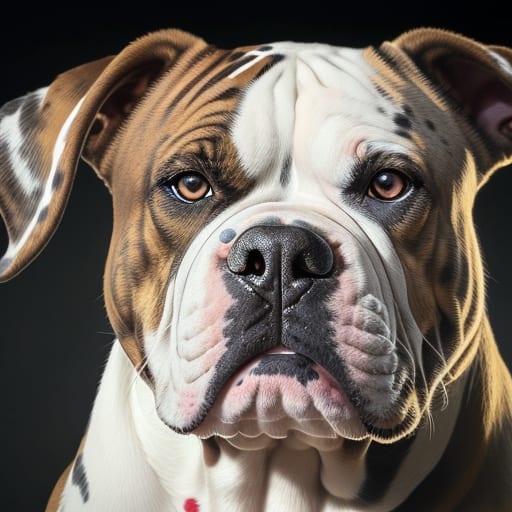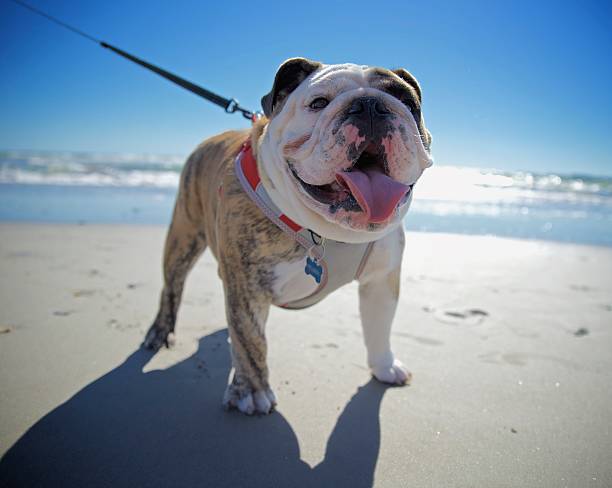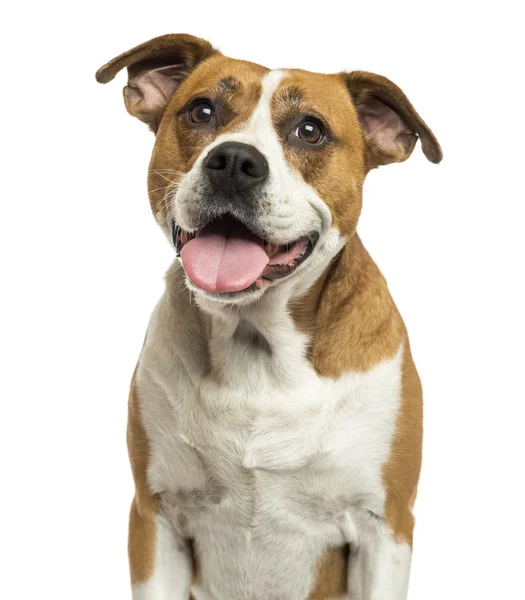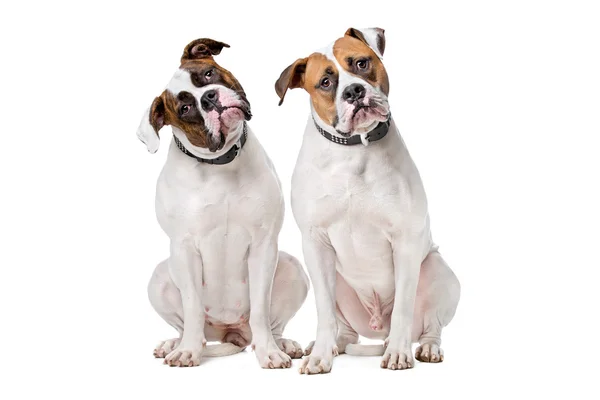The Johnson Bulldog, also known as the Johnson American Bulldog, is a breed that captures the hearts of dog enthusiasts and families seeking strength, loyalty, and unwavering dedication. With its muscular build, protective instincts, and steadfast loyalty, this breed has earned its place as a beloved family protector and a symbol of American canine resilience.

| Category (Explanation) | Breed Information |
|---|---|
| Year of Breed Conception | Early 20th century |
| Country of Origin | United States |
| Weight (Male) | 90-120 lbs (41-54.5 kg) |
| Weight (Female) | 80-100 lbs (36-45 kg) |
| Coat Type | Short, dense |
| Color Variations | White, brindle, or patchy |
| Shedding Level | Low to moderate |
| Height (cm & in) | 20-27 inches (51-69 cm) |
| Breed Size | Large |
| Trainability | Moderate |
| Mental Needs | Moderate |
| Intelligence Level | Moderate |
| Energy Level | Moderate to high |
| Agility | Moderate |
| Loyalty | High |
| Playfulness | Moderate to high |
| Exercise Needs | Regular exercise and play |
| Guarding Proficiency | Moderate |
| Sociability with Children | High |
| Barking Level | Low to moderate |
| Digging Tendency | Low to moderate |
| Destructive Behavior | Low to moderate |
| Drooling Level | Moderate to high |
| Obedience Level | Moderate |
| Apartment Friendly | Yes, with proper exercise and space |
| Inherent Prey Drive | Moderate |
| Physical Risk to Others | Low to moderate |
| Travel Fatality Risk | Low |
| Allergen Potential | Low (considered hypoallergenic) |
| Health Concerns | Hip dysplasia, joint issues |
| Average Life Expectancy | 10-15 years |










































































Woof Mastery is reader supported and our articles may contain affiliate links.
Instead of running third party ads that we have no control of we only use links from high-quality companies we are directly partnered with. Making use of these links come at no cost to you our reader, and in many cases have the extra benefit of discounted rates or sign up bonuses.
If you’re interested you can read more about our affiliate policy here.
We appreciate your support and always insure that the products and services we recommend are high-quality, helpful and relevant to the subject at hand!
The Johnson Bulldog, also known as the Johnson American Bulldog, has a history deeply rooted in the efforts of John D. Johnson in the mid-20th century. Johnson aimed to preserve and refine the American Bulldog breed, emphasizing the “bully” type, which prioritized strength and athleticism.
His dedication and careful breeding resulted in a breed that pays homage to the original American Bulldog’s heritage while embodying modern health and vitality.
Today, Johnson Bulldogs stand as a testament to the enduring legacy of their founder, John D. Johnson, and continue to be cherished for their strength, loyalty, and resilience, symbolizing the spirit of American bulldogs.

What sets the Johnson Bulldog apart is its focus on the “bully” type, emphasizing strength and athleticism. These dogs are known for their powerful physique and protective instincts, making them formidable guardians. Johnson Bulldogs combine their physical prowess with a deep loyalty to their families, making them exceptional guardians and devoted companions.
Their traditional role included hunting and working on farms, but they have transitioned into loving and protective family pets.
Johnson Bulldogs are renowned for their confident and courageous personalities. They are fiercely loyal, deeply affectionate, and incredibly protective of their families.
These dogs have a strong sense of duty and will go to great lengths to ensure the safety of their loved ones. Johnson Bulldogs have a fearless and determined spirit, often seen as the fearless defenders of their home and family. Their intelligence and determination make them highly trainable, although they may exhibit a stubborn streak at times.
While they may be initially cautious around strangers, they quickly form strong bonds with their owners and are intensely devoted. Johnson Bulldogs exemplify the ideal combination of strength and affection, representing not only a protective presence but also a loving and dedicated companion.
Johnson Bulldogs, or Johnson American Bulldogs, often possess a loyal and protective temperament. They may display affection towards their families while exhibiting protective instincts that require training and socialization to avoid overprotectiveness. Territorial behavior and occasional stubbornness can be managed with consistent and patient training methods.
Due to their strength, leash training is crucial. Careful introductions are recommended when interacting with other dogs, especially those of the same sex. Early training and socialization are key to nurturing a well-adjusted and balanced temperament in this breed. Johnson Bulldogs are dedicated protectors with a strong bond with their families.
Johnson Bulldogs, also known as Johnson American Bulldogs, are medium to large-sized dogs celebrated for their muscular and imposing build. They possess a square-shaped head, more pronounced in males, with a broad, well-defined jaw and muscular cheeks, giving them a commanding presence. Their eyes are typically brown.
Ears may be cropped or natural, depending on preference. These dogs have a short, dense coat, often in shades of white with patches of brindle or other colors.
The coat accentuates their powerful frame. Johnson Bulldogs feature a muscular neck, leading to a broad chest and strong, straight legs. The tail is usually straight.
In terms of size, males typically stand between 23 to 27 inches (58-69 cm) at the shoulder, and females are slightly smaller. Weight ranges from 90 to 120 pounds (41-54 kg) for males, with females being lighter.
Overall, Johnson Bulldogs project a powerful and confident presence, reflecting their history as protectors and working dogs. Their appearance exudes strength, determination, and loyalty.
Johnson Bulldogs, also known as Johnson American Bulldogs, are known for their strength and agility, with several color varieties, including:
Johnson Bulldogs, also known as Johnson American Bulldogs, have a low shedding level. They are not heavy shedders, and their shedding is typically minimal year-round. Occasional grooming and brushing with a soft bristle brush can help manage shedding and maintain their coat’s health.
Factors that affect shedding in Johnson Bulldogs can be influenced by genetics and overall health. Regular exercise, a balanced diet, and providing mental stimulation are essential for overall health and coat care, potentially reducing shedding.
Johnson Bulldogs are the epitome of strength, with their bristly short coats echoing their rugged nature.
Brushing: A bi-weekly regimen, alternating between a firm bristle brush and a grooming glove, is key to coat health. This not only manages shedding but also ensures effective removal of potential allergens or dust particles from their coat, reducing the chances of skin irritations.
Bathing: Given their robust nature, their skin is surprisingly sensitive. A monthly bath with a moisturizing, pH-balanced dog shampoo is recommended. Post-bath, consider using a dog-friendly leave-in conditioner to keep their coat in optimal condition.
Ears: The breed’s ears, medium-sized yet curvaceous, demand weekly cleaning. Additionally, ensuring they remain dry, especially post-baths or swims, can prevent fungal infections.
Nails: Their sturdy build means their nails, if overgrown, can cause substantial discomfort. Regular trimming, complemented with occasional filing, is ideal.
Teeth: With their broad jaws, comes the potential for dental issues. Daily brushing, combined with dental toys and regular vet checks, can keep oral diseases at bay.
Wrinkle Care: The breed’s notable facial wrinkles are not just aesthetically pleasing but also require care. Cleaning them daily, especially after meals, and ensuring they remain dry can prevent bacterial growth.
Eye Care: Their deep-set eyes, full of expression, need daily checks. Any abnormalities, including excessive tearing or a change in eye color, should be consulted with a vet.
Johnson Bulldogs, also known as Johnson American Bulldogs, have a moderate activity level. They are known for their strength and loyalty. Here are some key points to consider about their activity level:
Johnson Bulldogs, also known as Johnson American Bulldogs, possess a moderate level of intelligence, marked by adaptability, problem-solving abilities, and a strong desire to please their owners. Here are some key points about their intelligence:
While Johnson Bulldogs may not be as widely recognized as some other breeds, but their intelligence is evident in their exceptional trainability, problem-solving abilities, and unwavering loyalty. They are outstanding companions and guardians. Training, socialization, and mental stimulation are essential to help them thrive and fulfill their potential.
Johnson Bulldog, aka Johnson American Bulldog, with their alert minds, enjoy mentally stimulating endeavors. Activities that challenge their intellect, such as tracking games or obedience drills, are beneficial.
Social Interaction: Their robust and protective nature demands regular interactions with their human family. Isolation can lead to restlessness and potential behavioral challenges.
Exercise: Physical workouts not only cater to their strong build but also to their active minds. Engaging in activities like tug-of-war or fetch keeps them balanced.
Training and Obedience: Johnson Bulldogs benefit immensely from structured obedience sessions that mentally challenge them and foster their bond with their human companions. A reward-based approach is the most effective.
Routine and Structure: These Bulldogs find stability in routines. A well-structured day imparts a feeling of security and keeps anxiety at bay.
Affection and Attention: Despite their strong exterior, they seek affection and quality moments with their caregivers, reinforcing their loyal nature.
Socialization: Their protective streak makes early and varied social experiences essential for a balanced temperament.
Safe Environment: A calm household environment with a dedicated space for them ensures they have a refuge during overwhelming moments.
Consistency: A uniform approach in commands and daily schedules ensures they remain well-adjusted and confident.
Enter The Woof Mastery

Prior to bringing a Johnson Bulldog (Johnson American Bulldog) into your home, it’s crucial to recognize their needs. These dogs are known for their strength and loyalty. They require regular exercise and mental stimulation to stay happy and healthy. Training and socialization are vital to ensure they are well-behaved. Be prepared for potential health concerns, including hip dysplasia.
Responsible ownership includes providing love, attention, and a safe environment for these devoted and energetic companions.
Johnson Bulldog or Johnson American Bulldogs, a type of American Bulldog known for their bulkier build, have the potential to pose a physical danger if not effectively socialized, trained, or managed. A dog’s behavior depends on factors like temperament, upbringing, training, and owner commitment. Here’s their potential danger overview:
Johnson Bulldogs are renowned for their confident and courageous personalities. They are fiercely loyal, deeply affectionate, and incredibly protective of their families.
These dogs have a strong sense of duty and will go to great lengths to ensure the safety of their loved ones. Johnson Bulldogs have a fearless and determined spirit, often seen as the fearless defenders of their home and family. Their intelligence and determination make them highly trainable, although they may exhibit a stubborn streak at times.
While they may be initially cautious around strangers, they quickly form strong bonds with their owners and are intensely devoted. Johnson Bulldogs exemplify the ideal combination of strength and affection, representing not only a protective presence but also a loving and dedicated companion.
Johnson Bulldogs or Johnson American Bulldogs, one of the popular American Bulldog lines, bring unique swimming characteristics. Here’s what to consider:
While many Johnson Bulldogs can enjoy brief swimming sessions, always be attentive to their comfort levels and prioritize their safety.
Johnson Bulldogs, also known as Johnson American Bulldogs, like their canine peers, have their set of vocalizations for communication. Here’s what they might express:
For Johnson Bulldog owners, it’s vital to discern their dog’s vocalizations and the reasons behind them. While most sounds are just expressions of their character, others might indicate discomfort or a specific need. Positive reinforcement can be effective in guiding their vocal habits.
Johnson Bulldogs, also known as Johnson American Bulldogs, thrive in homes where they receive love, structure, and opportunities for socialization. Here are some ideal living conditions for Johnson Bulldogs:
Challenges:
When it comes to travel fatality risk for Johnson Bulldogs or Johnson American Bulldogs, consider the following potential constraints:
By keeping these pointers in mind and acting accordingly, traveling with your Johnson Bulldog can be much safer.
Johnson Bulldogs may be prone to specific health concerns. While not all individuals will experience these issues, it’s essential for Johnson Bulldog owners to be aware of potential health problems and work with veterinarians to maintain their pets’ well-being. Common health concerns in Johnson Bulldogs include:
Regular veterinary check-ups, a balanced diet, proper exercise, and responsible breeding practices can help mitigate some of these health concerns. It’s crucial for Johnson Bulldog owners to work closely with their veterinarians to monitor their pets’ health and address any issues promptly.
To ensure the health and well-being of Johnson Bulldogs, also known as Johnson American Bulldogs, it’s crucial to adhere to these specialized nutritional habits and best practices:
Breed-Specific Laws (BSL): Johnson Bulldogs, also known as Johnson American Bulldogs, might be subject to breed-specific laws (BSL) in some locales. These regulations can differ and are typically set by local or municipal authorities.
Types of Restrictions: BSL restrictions for Johnson Bulldogs could encompass mandatory spaying/neutering, specific licensing, liability insurance obligations, requirements for muzzling in public areas, and in certain instances, ownership bans based on regional directives.
Rationale for BSL: BSL often arises from safety concerns linked to certain breeds, especially in light of any incidents. While Johnson Bulldogs are cherished for their loyalty, their size and power can lead to BSL scrutiny.
Controversy: The applicability and fairness of BSL remain debated, with a call for a focus on individual dog behavior and responsible ownership over breed-specific restrictions.
Local Regulations: Prospective Johnson Bulldog owners should familiarize themselves with any local regulations and consult local authorities to ensure they are in compliance.
Woof Mastery is reader supported and our articles may contain affiliate links.
Instead of running third party ads that we have no control of we only use links from high-quality companies we are directly partnered with. Making use of these links come at no cost to you our reader, and in many cases have the extra benefit of discounted rates or sign up bonuses.
If you’re interested you can read more about our affiliate policy here.
We appreciate your support and always insure that the products and services we recommend are high-quality, helpful and relevant to the subject at hand!
Myth 1: Johnson Bulldogs (Johnson American Bulldogs) are Aggressive by Nature
Myth 2: They are High-Energy Dogs
Myth 3: They Can’t Tolerate Cold Weather
Myth 4: They are Not Good with Children
Myth 5: They Shed Excessively
Myth 6: They Don’t Require Training
Myth 7: They are Always Good with Other Dogs
Myth 8: They Are All the Same Size
Myth 9: They are Unhealthy Dogs
Myth 10: They are Always Clingy
The Johnson Bulldog (Johnson American Bulldog) holds cultural significance in various contexts:
While there may not be as many famous Johnson Bulldog owners as there are for other dog breeds, here are a few notable individuals who have been associated with Johnson Bulldogs: Rural Legends: Many tales from rural areas feature this breed, with local heroes often owning a Johnson Bulldog. Indie Musicians: Some lesser-known musicians from the South have mentioned their Johnson Bulldogs in their songs and album artwork. Film Characters: Various independent films have showcased characters with Johnson Bulldogs, reflecting the breed’s American roots.
Johnson Bulldogs, like many other dog breeds, have faced several threats and challenges over the years. Some of the significant threats and issues that have affected the breed include:
The Johnson Bulldog is believed to have been developed from a combination of various breeds, with the primary ancestors being the original American Bulldogs brought over by early settlers and Mastiff strains. The breed’s development was primarily influenced by John D. Johnson in the southern United States. The specific breeds and strains that contributed to the Johnson Bulldog’s development include:
Johnson Bulldogs, also known as Johnson American Bulldogs, are a wonderful blend of strength and affection, making them exceptional family companions. With their muscular build and loving disposition, they seamlessly integrate into our lives, becoming cherished members of our households.
These dogs excel as watchdogs, displaying protective instincts that further solidify their role as guardians of our homes. Johnson Bulldogs are known for their adaptability, thriving in various living conditions, and requiring only minimal grooming. Their athletic prowess and playful spirit cater to active individuals and families, making them excellent playmates. Their intelligence shines in activities and training.
Beyond their physical attributes, Johnson Bulldogs bring a unique charm to every household, filling the air with their presence. Their versatility is a testament to their adaptability, transitioning effortlessly from beloved family pets to diligent working dogs.
Most importantly, Johnson Bulldogs offer profound and unconditional love, forging an unbreakable bond that enriches our lives. If you’re seeking a loyal and affectionate companion, embrace the love and devotion of a Johnson Bulldog, also known as the Johnson American Bulldog.